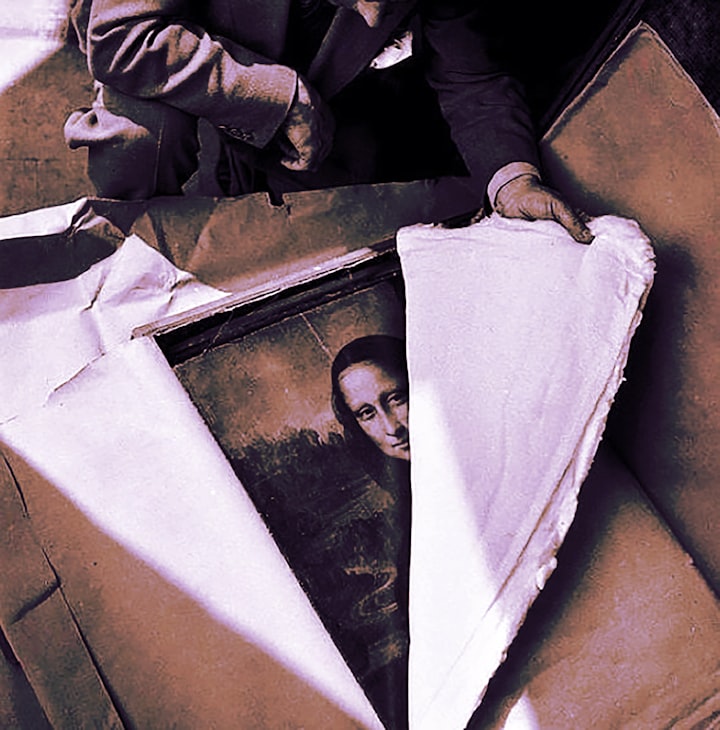Da Vinci Procrastinated Too
There's a reason why we all do it
I write full time, which is a bold move on my part because, well, I am a high-functioning mess of a human and a procrastinator down to my core. As if the very bones of my body seemingly forget how to start work but know how to end up mindlessly scrolling down a stranger’s Instagram for hours.

Even in college, when I planned out writing a senior thesis on society’s construction of Sylvia Plath, I imagined myself in the library (not in sweats), typing away for months on groundbreaking sentences. I alone would rewrite the world’s view on Plath. Little by little, I’d chip away to write an excellent paper because I had every intention to succeed. As the semester went on, frankly, the paper didn’t. And so, I ended up cramming all the workload into one day and created a jumble of horrible sentences I hoped sounded kind of smart. Luckily, I never saw the professor again after he read my paper because it was heinous, and that would have been embarrassing.
After graduating college, I figured adulthood would kick into full gear, and suddenly I’d be like my mother, a master of time management.
But that didn’t happen either.
Instead, my procrastination leveled up. I unlocked new skills like multitasking and an intense caffeine tolerance. I tried little tricks like removing Facebook from my phone, but youtube rabbit holes of talking dogs spiraling into Ted Bundy’s last interview quickly replaced it. I continued taking writing job after writing job, somehow scrambling at the last minute to turn it in.
Deadlines from my clients became a necessity. Time kept doing its thing, and the panic- thank you, anxiety- kicked in full gear. And if you’re like me, then waiting until the last minute became the only way I’d start. If I wrote 10,000 words in one day, then there’s no reason why I couldn’t do it again...and again.

But it’s not just school or work that the procrastination beast takes over. It’s in our relationships, in getting fit, cleaning the house, finances, reading that particular book, or watching that new show. It’s found in every part of our daily life, and it was standing in front of my future like a massive brick wall. These parts of life don’t have deadlines; therefore, there’s no reason for anxiety to kick in and wreak havoc like a drill sergeant in a megaphone screaming, Go! Go! Go! So, we put them off, tuck them away and tell ourselves, “I’ll start working out tomorrow.”
These quiet, pestering life goals and ambitions become sources of unhappiness and even more anxiety. They stick with us because procrastinating doesn’t remove them; it prolongs them. And the next step for the dream is never taken because you are stuck before the first one ever happens. Even though you see your feet deep in the mud, you can’t yank them free.
I wanted to change this. I wanted to understand why I was this way. And while everyone has some form of the procrastination beast, I wanted to know why mine and many others were so powerful.
Procrastination isn’t an illness. It’s a habit, and there’s some serious business going on in your brain.
The prefrontal cortex is where the higher level of thinking occurs. It’s the part that looks at an assignment and says, “Yeah, we should start the vocal article today, so we have the week to hammer it out.” And that’s a great plan. But, the limbic system, a much more primitive part of the brain, decides it's time to mindlessly open the pantry, even though we opened it twenty minutes ago. No invisible man stocked more Doritos in there. Not today.
A new situation is introduced, and sometimes the limbic system switches on- ready to go. It wrestles the rational prefrontal cortex down, and it wins immediately because it has the help of the amygdala. The amygdala is the fun part of our brains that responds to threats in the world. Fight-of-flight. It does a wonderful job of protecting us from angry bears and swarms of wasps.
But not so much in day-to-day life, unless you’re living like Bear Grylls.

I wonder if his name were something like Leslie or Kevin Grylls if he'd still know about survival, or if he'd just really be into barbecue.
Anyway, that paper or ending a bad relationship creates a wave of fear in us, and the amygdala recognizes this as a threat. Doesn’t matter if it's a bear, paper due, or maybe even Bear Grylls. Your animal brain reacts to the stressor, and the amygdala is rolling with it. No questions asked. It takes charge and shutting off our rational thinking, searching out some form of instant gratification to distract us. It’s experiencing negative emotions of being overwhelmed or dread. Our primitive brains can only react at a subconscious level to that fear.
But there are ways to help. As I said, procrastination is a habit. And the best way to beat it is to become aware of your own thoughts. The primitive mind is going to do everything in its power to take control.
There are a lot of little tips you can put into play to help become aware of the animal brain: make a clean workspace, turn your phone off, set a timer to work in chunks. Breaking down a job into small parts works for me. I write down a list and, bit by bit, check it off. The sense of accomplishment is powerful and encouraging. Plan out the process and give yourself time to do the task. Prepare for distractions and take notice of what you turn to the most.
But there’s more to it than a simple, easy step-by-step guide on how to free yourself of procrastination because a lot of that fear and procrastination stems from self-doubt.
Self-doubt is crippling. It stops us from being able to separate our own identity from whatever we want to accomplish. Everyone has it; it’s one of the joys of being human, but we have to learn to replace self-doubt and acknowledge we will fail at points. I know that it seems like common sense. You’ve heard it your whole life.
But - your idea or plan failing does not automatically mean you are a failure. It’s a practice of thinking. I only focused on writing other people’s books because I was petrified no one would like my work. That fear is still there, but I’ve slowly learned to replace it with the fear of never attempting my goals as a writer, including this article (which I might have waited the last minute to write).
Don’t fear failure in life; learn to fear never starting your dreams or desires. The small steps help and work, but overcoming procrastination is about overcoming your self-doubt. No one really cares about your failures. It’s the success that they will remember.
Look, Leonardo da Vinci took sixteen years to paint the Mona Lisa. Much of his work went unfinished. He almost stopped and gave up on everything, but he pulled through and ended up creating several masterpieces.
I’m not saying you need to create the next Mona Lisa, but you could if you wanted. Because da Vinci also had a life full of doubt and fear just like you. Everyone struggles with procrastination in life. And once you start realizing what you are putting off and recognizing the creeping fear and dread as nothing but a primitive reaction, you can start living your life the way you want to. Maybe you can even begin today, tomorrow, or sometimes this spring. Just know, once you realize you are stuck, you’ve already taken the first step.

About the Creator
Alyssa Caswell
Sometimes, I write stories







Comments
There are no comments for this story
Be the first to respond and start the conversation.